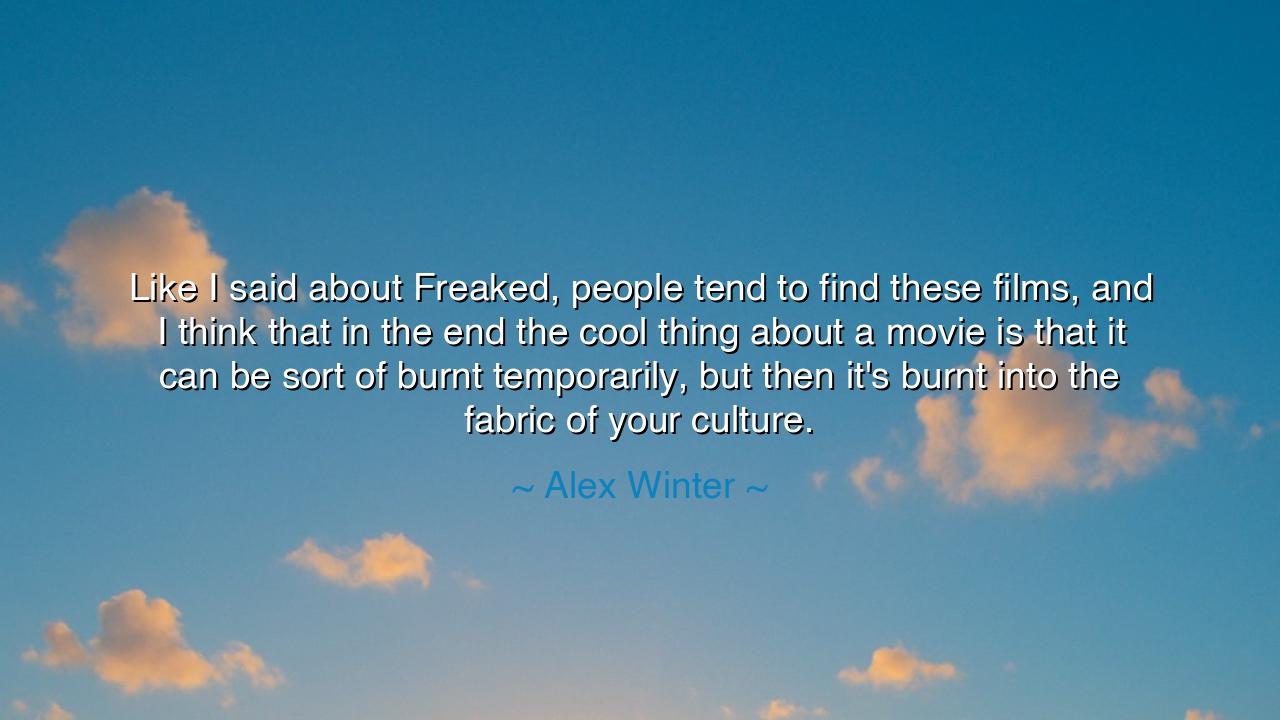
Like I said about Freaked, people tend to find these films, and I
Like I said about Freaked, people tend to find these films, and I think that in the end the cool thing about a movie is that it can be sort of burnt temporarily, but then it's burnt into the fabric of your culture.






On the Endurance of Art and the Fire of Cultural Memory
When Alex Winter said, “Like I said about Freaked, people tend to find these films, and I think that in the end the cool thing about a movie is that it can be sort of burnt temporarily, but then it's burnt into the fabric of your culture,” he was speaking as both an artist and a philosopher — one who understands the strange alchemy of time, memory, and creation. His words carry the essence of an eternal truth: that art, though it may fade from sight, never truly dies. The “burning” he describes is both destruction and consecration — a cleansing fire through which the work of the spirit passes before being woven into the collective soul of humankind.
To be “burnt temporarily” is to endure misunderstanding, neglect, or even ridicule. Many works of genius — paintings, poems, songs, and films — are scorned or forgotten in their own time. Yet the fire that seems to consume them is not their end, but their transformation. Like a phoenix, their meaning rises from the ashes, finding new life in the minds of future generations. What Winter calls “burnt into the fabric of your culture” is the process by which time itself becomes the artist’s greatest collaborator. Through repetition, rediscovery, and reinterpretation, the once-fleeting work becomes immortal.
History is full of such resurrections. The painter Vincent van Gogh, for instance, died in obscurity, his art dismissed as madness. Yet, decades after his death, his brushstrokes — once seen as chaos — were recognized as the pulse of human emotion itself. His work, once “burnt temporarily” by the indifference of his era, became woven into the fabric of modern art, shaping not only how we see but how we feel. The same is true of many films and books once overlooked — like Winter’s own Freaked, or Ridley Scott’s Blade Runner, which was ignored upon release but later became a cornerstone of science fiction. Time has a way of uncovering buried truths, and culture has a way of keeping its treasures, no matter how long they lie hidden.
There is wisdom here beyond art. For Winter’s reflection speaks also to the human condition. Every life, in its striving and creation, passes through periods of fire — of rejection, failure, or invisibility. We, too, are “burnt temporarily,” tested by forces that threaten to erase our efforts. Yet what endures is not the praise we receive, but the imprint we leave on others — the subtle mark upon the collective spirit of our time. Just as the movie is absorbed into the cultural fabric, so too are our actions absorbed into the larger story of humanity. To live with integrity, to create with sincerity, is to ensure that something of our being — however small — becomes part of the world’s living memory.
The ancients understood this better than most. The poets of Greece, the sculptors of Rome, and the storytellers of Egypt created not for the fleeting applause of their day, but for eternity. They knew that true art is not preserved in marble or scrolls alone, but in the consciousness of those who come after. Homer’s Iliad, once carried only by the breath of singers, became the cornerstone of Western thought. Even if it had been forgotten for centuries, its rhythm and wisdom would still have lived on — for it had already been burnt into the fabric of civilization. So it is with every true act of creation: it transcends its moment, crossing the boundaries of time to become part of something larger.
Alex Winter’s words remind us that art, like fire, consumes but also transforms. The burning of a film, a song, or a dream is not a loss, but a rite of passage. When a work is forgotten, it waits patiently in the silence of history until a new generation rediscovers its flame. And when that happens, the art no longer belongs to its maker — it belongs to the people, to the world, to the culture it has now entered. It becomes a shared memory, a spark passed from hand to hand across centuries.
The lesson, then, is one of patience and faith. Create not for the moment, but for the eternal. Whether you are an artist, a thinker, or a dreamer, know that your work may be misunderstood today — but if it carries truth, it will endure. Time may burn it for a while, but fire only refines what is pure. Live and work in such a way that what you build cannot be destroyed, only transformed. Let your actions, your words, your creations become threads in the vast tapestry of humanity.
Thus, in Winter’s reflection, we find the ancient law of legacy: that nothing true is ever lost. The fires of time may consume all things, but they also forge the indestructible. And so, let every soul take heart — for though the world may forget your name, if your work carries sincerity, compassion, or wonder, it will one day rise again, burnt not away, but into the very fabric of our shared existence.






AAdministratorAdministrator
Welcome, honored guests. Please leave a comment, we will respond soon